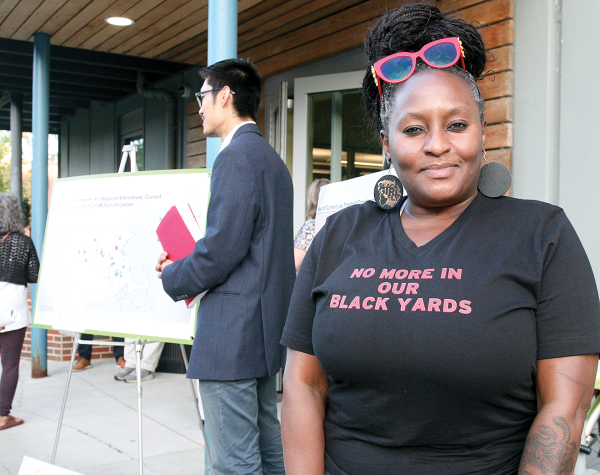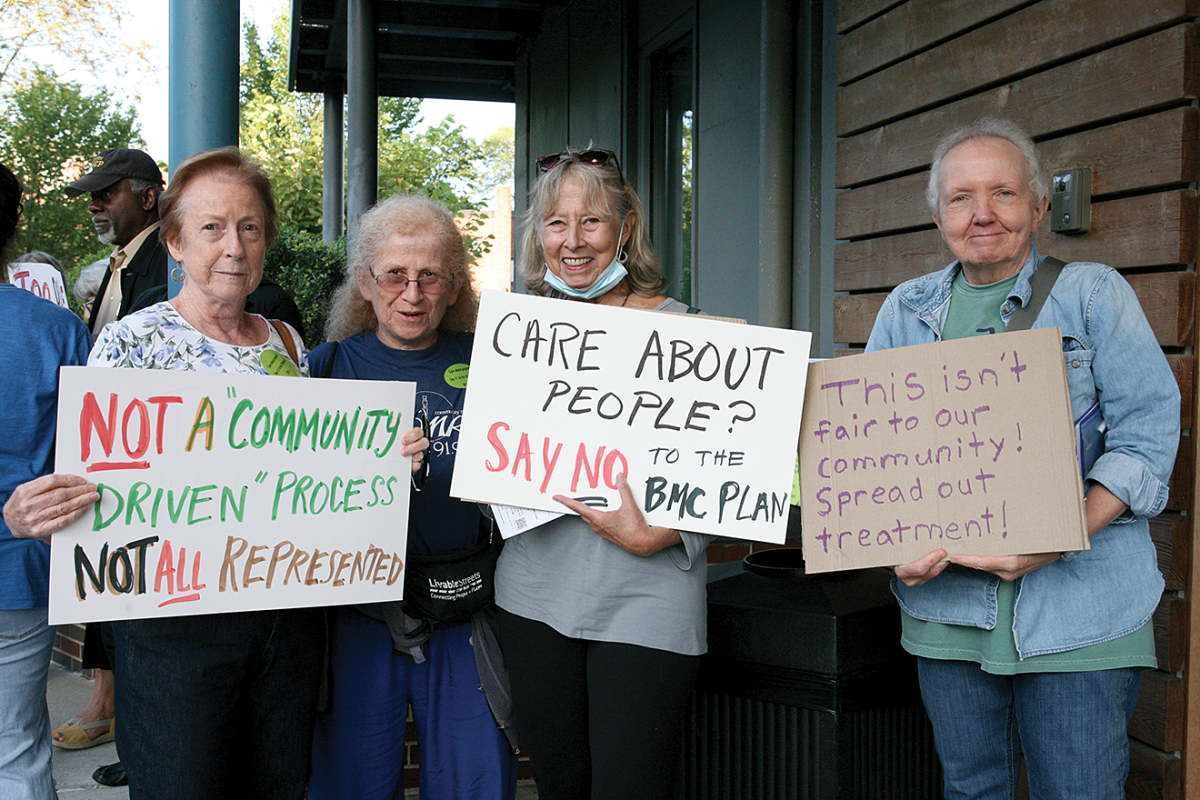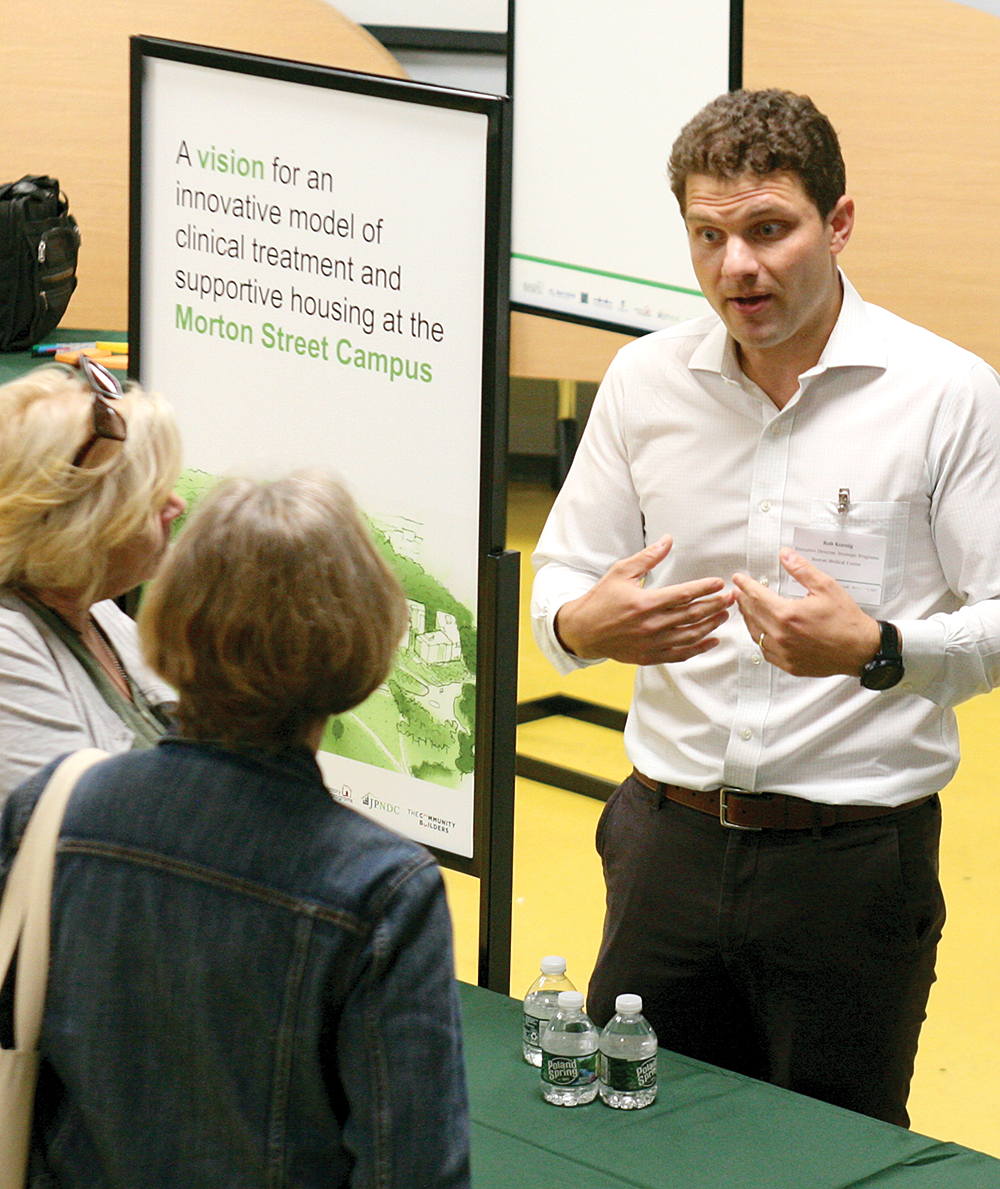September 27, 2023

Renee Welch, a neighbor to Franklin Park on the JP side, said BMC has left out Black and Brown communities from early discussions, and added that the proposal floats a false narrative about easing the housing crisis. Seth Daniel photo
The first in-person community meeting regarding a controversial proposal by Boston Medical Center to build supportive housing at the Shattuck Hospital site on the Dorchester-Jamaica Plain border took place last Tuesday (Sept. 19) at the Lena Park Community Center in Dorchester.
It was a tale of two meetings: BMC officials and some of their partners convened in an official session inside the center, while a group of residents, mainly from Dorchester, Mattapan, and Jamaica Plain, held an impromptu unofficial event on the grounds outside.
The controversial plan to convert the hospital into 851 units of supportive housing and supply recovery services on the campus drew both supporters and opponents, with some of the latter holding signs aimed at blocking the project.
“The concern we’ve heard is that the challenges of Mass. and Cass are coming to Franklin Park, and that is not happening. That is not our plan,” said Rob Koenig, BMC’s executive director of strategy. “The mix of services we proposed…is recovery services and permanent supportive housing as well as an emergency housing program that’s been operating at the Shattuck for a long time. So, we’ve tried to be really thoughtful about the way in which by changing the mix of services we can actually prevent crises like Mass. and Cass through much better [coordination].”

Dorchester resident Marti Glynn joined Franklin Park advocate Sarah Freeman.
Renee Welch, who lives near Egleston Square in Jamaica Plain, was one of those gathered outside. She disagreed, emphatically.
“[BMC] went to other groups but didn’t include Black and Brown people and their groups in the beginning,” she said. “That concerns me because it feels intentional. ... They would have gotten support for the original RFP, but now we’re at 851 units. We do need more housing, but we need more low-income housing. This is not that. They are tying in housing to sell a narrative that is wrong and it’s false.”
How and when to re-purpose the Shattuck facility has been a hot-button issue since 2018 when state officials proposed demolishing the Shattuck and moving its services to the South End. Planning meetings were held over two years in the Franklin Park Clubhouse, with an RFP from the state emerging in 2022 that reflected a minimum of 75 to 100 units. The BMC-led proposal was the only one submitted by that summer, and concerns were immediately raised because there were now 851 units under discussion.
Beyond that, the addition of “low-threshold” housing, where residents can actively use substances, has become a sticking point as well. According to the initial proposal presented to the state, BMC’s plan includes 326 treatment beds, 200 units of permanent supportive housing for individuals, 205 units of permanent supportive housing for families, and 120 emergency shelter units – all on 13 acres of property along Morton Street at the nexus of Mattapan, Dorchester, Roxbury, and Jamaica Plain.
As to amenities, more than 50 percent, or 2.9 acres, of the campus would be open/green space for park uses.

Rob Koenig, executive director of strategic programs at BMC, explains some of what he sees as the positives to the BMC-led proposal for the Shattuck Hospital site. Seth Daniel photos
Koenig said the BMC proposal came in larger than expected because the substance use problem and housing crisis in the city have grown progressively worse.
“We looked at the need for people who are grappling with, and trying to heal from, behavioral health conditions or struggling with homelessness or housing insecurity and we put forward a proposal we feel can make a meaningful impact on the people we are providing care for, and that also fits the scale of the site,” he said.
He added that they expect to pull their clientele and residents mostly from the surrounding neighborhoods – those who are already patients and clients at BMC’s South End campus.
During the meeting, it became clear that most of the voices inside and outside the community center were there to oppose the plan, or to voice serious concerns, but on story boards laid out to gather written input via Post-It notes, there was a variety of opinions.
One note writer asserted that “the plan is too dense for any location, especially the park,” while another said that “Many women and children will live in secure housing.” There was mention of 2022 assault in which an elder of Boston’s education and civil rights community—Jean Maguire— was victimized near the campus. “Remember what happened to Jean Maguire,” the writer posted. Still another Post-It was a cry for help: “Desperately needed! Housing creates stability. This is how we stop situations like Mass + Cass.”
One board featured a crisp back-and-forth. Someone had written, “Hell no!” and JP resident Cynthia Bainton responded with “Hell yes!” and explained why she is in full support of the plan.
“We’re trying to serve and should serve all members of our community and not some members,” Bainton said. “We’re in a housing crisis and I strongly support this project that will have many units for individuals that need them. I think the park is big enough to serve everyone.”
Derek Christopher Evans, a Roxbury resident who volunteers his time at Mass. and Cass helping people on the street reconnect with family and advocate for themselves, said his main concern is sexual violence. He said that crime against women at Mass. and Cass is bad, and he fears it will get worse in Franklin Park.
“Just like there is a convergence of problems [at Mass. and Cass], there needs to be an equally parallel convergence of solutions,” he said. “If you move them over here, you will make all these convergent problems worse.
“If any place is more conducive for a large uptick in what is pervasive down [at Mass. and Cass], it going to be at this park,” he continued. “If you’re a guy whose license plate is listed on the ‘bad date’ list and who robs these people of money and dignity time after time, if that type of guy would think Mass. and Cass is like free and reduced lunch, then he would think Franklin Park is a free buffet.”
Karen Mauney-Brodek, president of the Emerald Necklace Conservancy, was posted outside the meeting with a presentation that showed all the former state hospitals throughout the region – hospitals that are vacant and not being used. She said using those facilities with smaller numbers makes more sense than Franklin Park.
“These would be ideal to be considered for a regional model,” she said. “It would be good to see a regional plan and not a reactive process,.”
Koenig and BMC representatives said they are still in the beginning stages of refining their proposal, as they have only been provisionally designated by the state. More meetings of differing types and focuses are expected through the end of the year. If the BMC planning is approved by the state, it will move to a city permitting process, including what is expected to be a traditional Article 80 process with the Boston Planning and Development Agency (BPDA).


